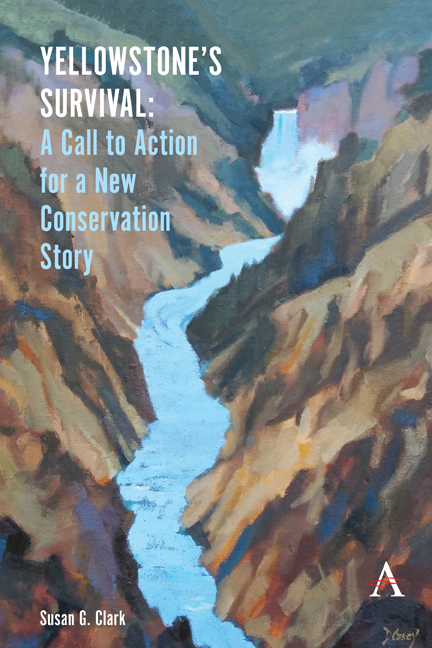 Yellowstone's Survival - A Call to Action for a New Conservation Story
Yellowstone's Survival - A Call to Action for a New Conservation Story Experience is a hard teacher
because she gives the test first,
the lessons afterwards.
— UnknownYellowstone is a national park, a concept of a greater ecosystem, and, even more so, an “idea” about the wild, wildlife, and people. This “idea” is in our stories of hope for a future where humans live sustainably with nature— something we’re presently not doing. Yellowstone as a reference point for nature is widely recognized no matter where one lives on our home planet.
What is this book about and why did I write it? These two questions have complex and incomplete answers, as explained in this preface and the text of all chapters. First, about this book: it is focused on Yellowstone National Park as a place and an idea with a long history, a present to be visited, and a contested future that we have long argued over. Yellowstone as a theme and symbol grounds this book in a place, time, and set of issues. I give scientific data, use systems thinking, and talk about grounded case examples concerning Yellowstone. Beyond that, most importantly, this book concentrates attention on people in general and on those who care about Yellowstone, including ourselves.
In so doing, I bring in knowledge from many fields seldom used currently by people worried about Yellowstone's future. The present focus of attention by most people is on biophysical things “out there” (e.g., wolves and bears, elk migrations, diseases, and fires). Consequently, it misses a huge component in Yellowstone's future— people, us. I organize the information I offer around people and work to give us context— historic, social, and political— for all things Yellowstone. Because Yellowstone's future has yet to be written, we can use this information in new integrated ways to create a healthy, thriving future for greater Yellowstone and ourselves.
This book's contents go well beyond Yellowstone as a geologic and biologic phenomenon to concentrate upon human beings. It is about the individuals who support conservation and sustainability in their thinking, feelings, and actions. It is also a reflection on our society and an exploration of a new way forward for better outcomes in all areas. The proposal here is to advance sustainability in the present in Yellowstone and outward far beyond that special place to other places worldwide. Many of us are alarmed by the ways in which environments, other living forms, and peoples are being treated.
To save this book to your Kindle, first ensure no-reply@cambridge.org is added to your Approved Personal Document E-mail List under your Personal Document Settings on the Manage Your Content and Devices page of your Amazon account. Then enter the ‘name’ part of your Kindle email address below. Find out more about saving to your Kindle.
Note you can select to save to either the @free.kindle.com or @kindle.com variations. ‘@free.kindle.com’ emails are free but can only be saved to your device when it is connected to wi-fi. ‘@kindle.com’ emails can be delivered even when you are not connected to wi-fi, but note that service fees apply.
Find out more about the Kindle Personal Document Service.
To save content items to your account, please confirm that you agree to abide by our usage policies. If this is the first time you use this feature, you will be asked to authorise Cambridge Core to connect with your account. Find out more about saving content to Dropbox.
To save content items to your account, please confirm that you agree to abide by our usage policies. If this is the first time you use this feature, you will be asked to authorise Cambridge Core to connect with your account. Find out more about saving content to Google Drive.